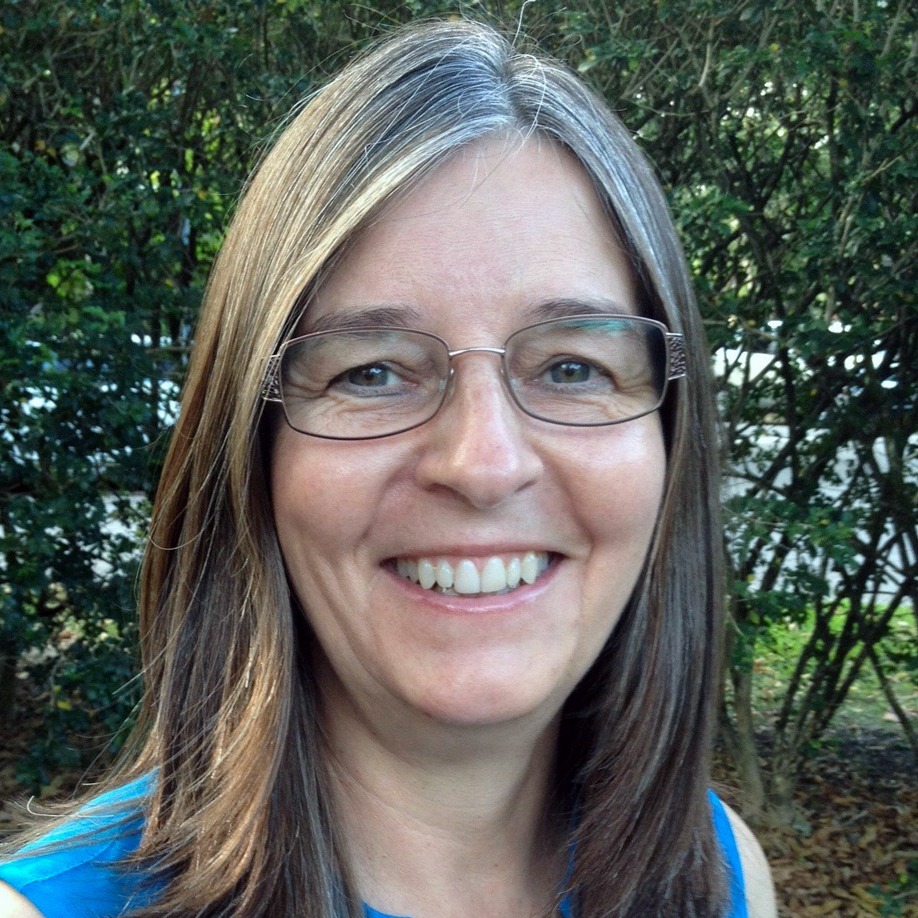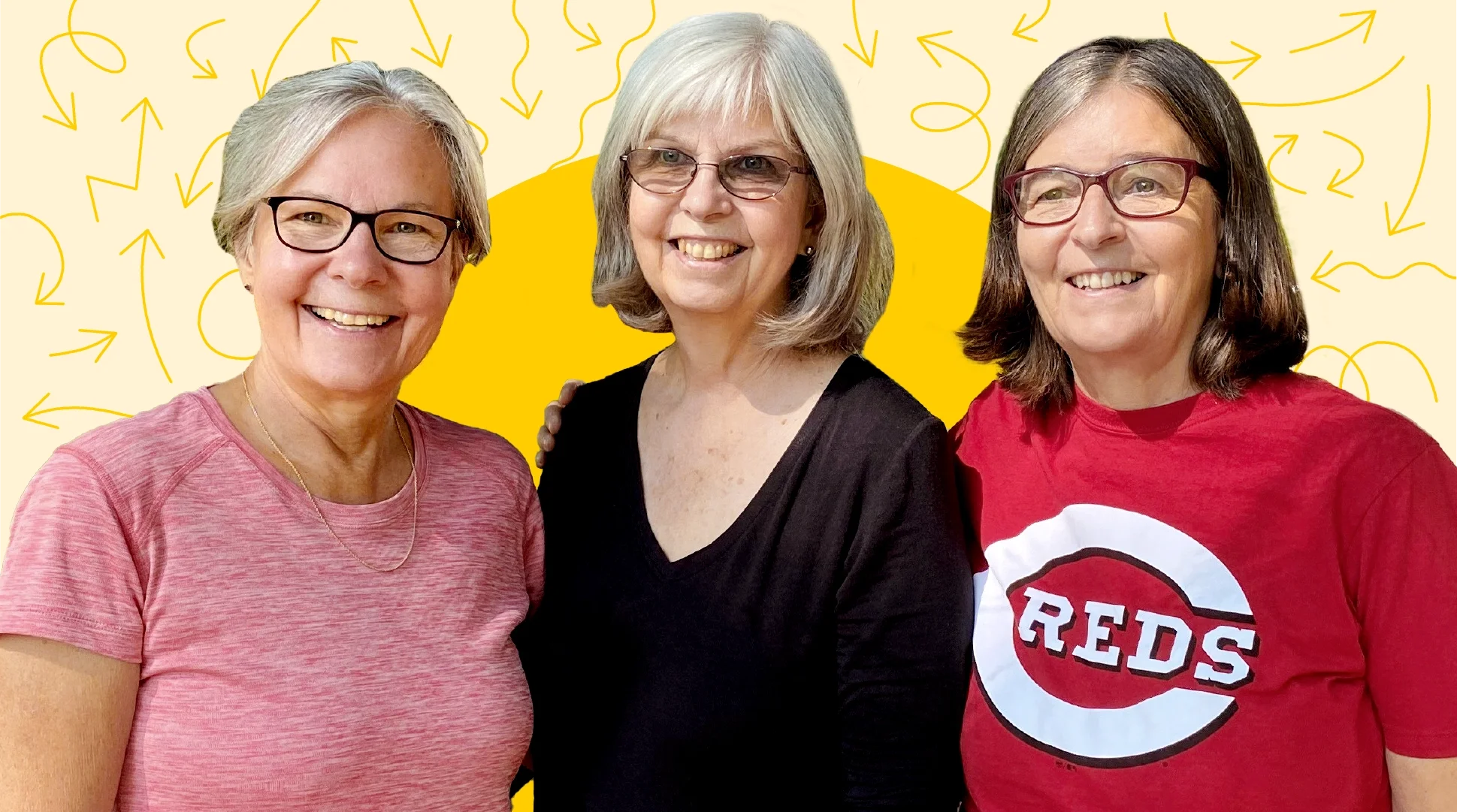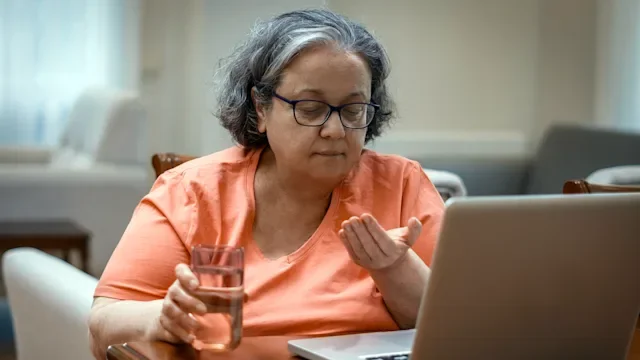Key takeaways:
Caring for someone with Alzheimer’s or dementia requires patience, humility, and caregiving skills on many fronts: personal, emotional, medical, and financial.
Caregiving can stretch for years and gets more difficult as a loved one’s personality, emotions, and ability to recognize family members slips away.
It helps to be flexible, keep a sense of humor, and embrace a tolerant and unselfish mindset as you care for someone with a serious brain disease.
When the neuropsychiatrist finished his assessment of my 79-year-old mother, the diagnosis confirmed what my sisters and I had suspected but wanted desperately not to believe: Mom had Alzheimer’s disease.
Her verbal and language skills were still surprisingly good, the doctor said. He explained that her flat responses to his questions were because of the way dementia affected the front part of her brain. It’s an area that controls abstract thinking, planning, concepts of time and calendars, and doing things in order.
My two sisters and I had an inkling of what to expect. After Mom’s open-heart surgery 8 years earlier, her cardiac surgeon told us that short-term memory problems might be a complication during her recovery. She also had a family history: Her mother and sister had advanced Alzheimer’s when they died, and her father had died of pneumonia and suspected Alzheimer’s.
Caregiving: A difficult, rewarding experience
Taking care of Mom for the next three years was hard. It was also more bizarre, taxing, and rewarding than we could have imagined. The hardest part was watching our mom fade away a little bit more each day.
We couldn’t fathom what was happening to the woman everyone called “Ruthie.” She was a snappy dresser. She cooked effortlessly for 30 to 40 relatives every Thanksgiving. She was a meticulous housekeeper. During her career, she worked as a WWII U.S. Army Signal Corps secretary, an accomplished bookkeeper, and school administrative secretary. But over time, she:
Forgot how to pay bills and balance the checkbook
Did things like remove dripping wet clothes out of the washing machine mid-cycle, toss them into the dryer, and turn it on
Insisted on wearing the same green pantsuit, day after day, for months
Couldn’t smell rotting meat in the basement freezer for 5 straight 90-degree days
One day baked her famous chicken casserole in a small 8x8-inch pan and served it — and only it — to 14 hungry family members, five of whom were ravenous teenage grandsons
A caregiving plan of shared duties and responsibilities
My two sisters and I adopted a team approach to caregiving. My younger sister, Carol Hone, who lived closest to Mom and Dad, handled the everyday care and check-ins. Were they eating? Taking their medicines? Showering? Exhibiting new symptoms? Safe?
My older sister, Cindy Felver, handled financial, legal, and insurance issues, including Medicare and health plan benefits, living wills, legal wills, and asset management.
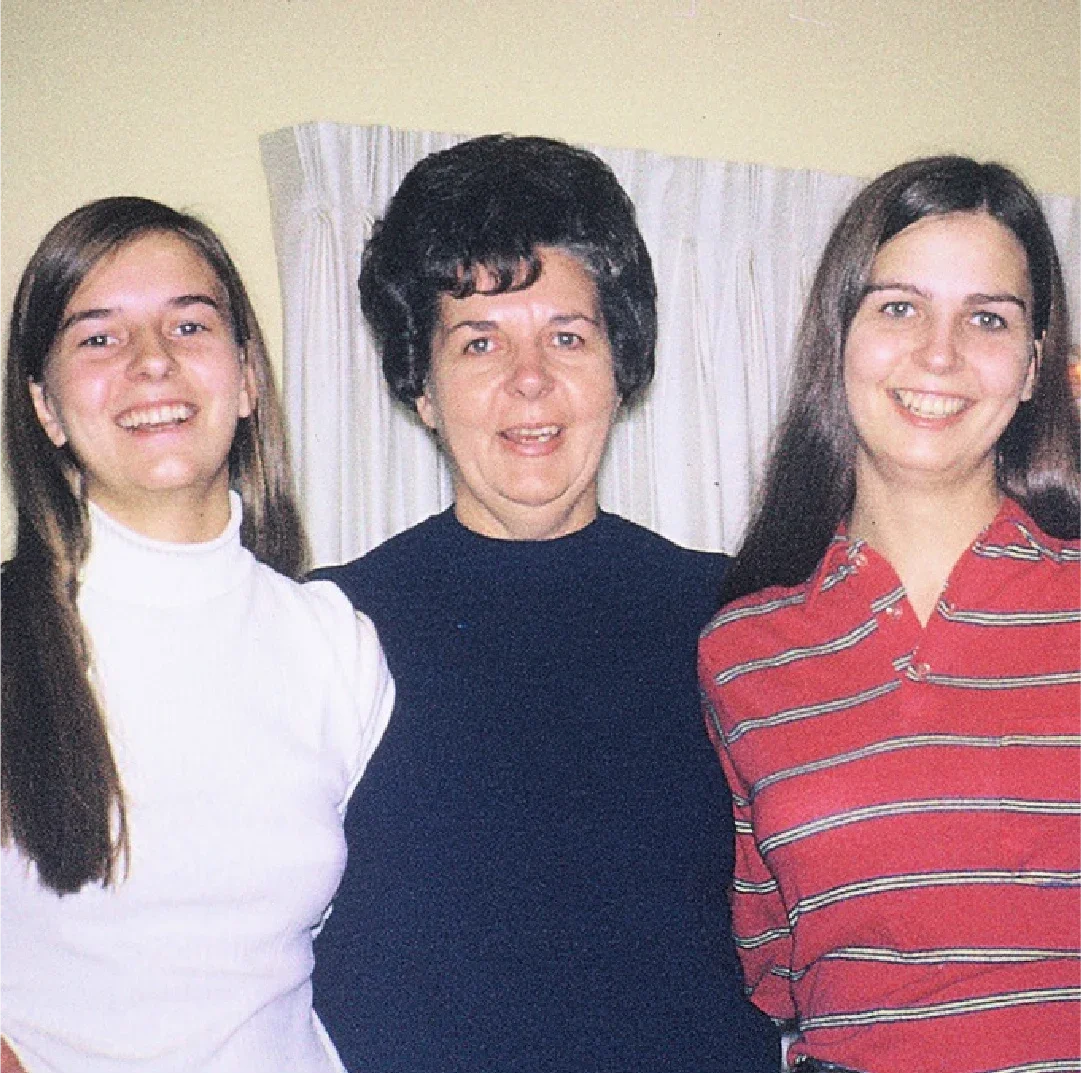
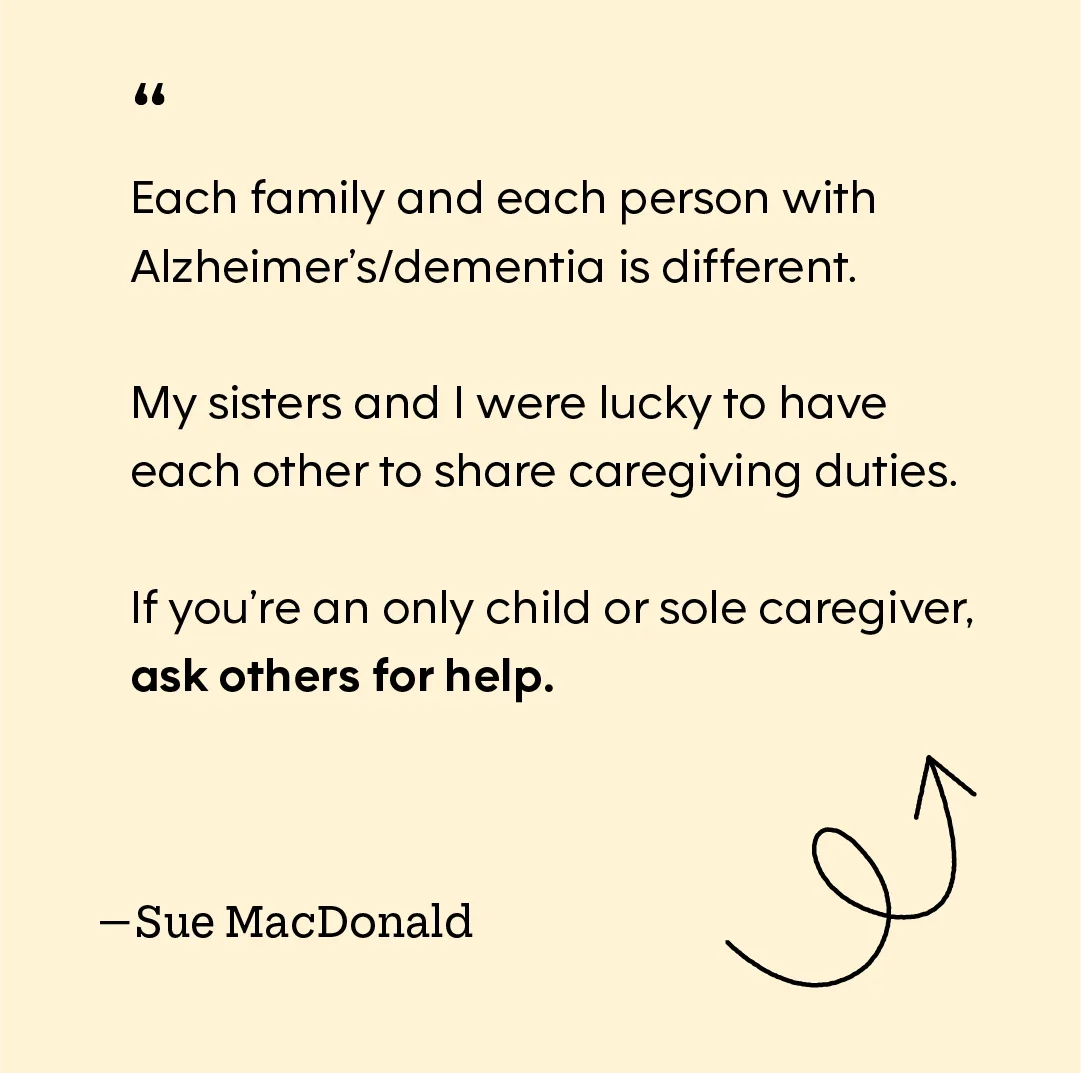
Because I lived two hours away, I filled in as the weekend caregiver and served as the point of contact with Mom’s psychiatrist and other specialists. From our team approach to caregiving, we identified these tips and strategies.
Day-to-day caregiving: Physical, emotional, unpredictable
Develop a thick skin now, and don’t take it personally. As a caregiver, you might be yelled at, accused of doing things that seem outrageous, unrecognized as a family member, kicked, punched, scratched, and belittled. Caregiving requires amazing amounts of patience and acts of kindness that your loved one might never acknowledge. Remember that you care because you love.
Don’t believe everything your loved one with Alzheimer’s tells you. If you ask questions, the answers you receive might not be true or make sense. Make decisions based on accurate information that you observe, not what you’re told by someone whose cognitive abilities are declining.
Keep baby wipes, extra underwear, adult diapers, and a clean change of clothes on hand. Have these ready at home, in the car, and wherever you go. Accidents with bladders and bowels do and will happen, often when you least expect them.
Be creative, and keep your loved one engaged. Play or sing their favorite music. Read to them. Do arts and crafts, take walks, play cards or board games, or dig in a garden. Encourage any activity they once enjoyed. Look at old photographs to trigger memories and conversation.
As the end of life nears, give them permission to go. During an unusual 18-hour stretch of mental clarity about six weeks before Mom died, all three of us had the opportunity to tell her: “We love you. You’re a wonderful mom. You’ve been through a lot the past six years. It’s OK to go. We’ll be fine, and so will your grandkids. Go find your sister and brothers because they’re waiting for you.” We were all at her bedside when she died. She was 82.
Medical caregiving: Keep your loved one’s wishes in mind
Ask your family members about their wishes for care while they are still capable of communicating and making decisions. What kinds of medical treatments do they want — and not want — as their health declines? Do they want CPR if their heart stops? Do they want tube feeding if they can no longer eat, drink, or swallow? Mom was clear from the time we were young that she did not want extraordinary measures to keep her alive if she developed the same symptoms and decline as her mother.
Ask for honest, frank answers from the doctors overseeing your loved one’s care. What are the possible side effects of medications they prescribe? Are certain medications necessary, given that Alzheimer’s has no cure? Over the course of Mom’s dementia, she was prescribed at various times: Galantamine (then called Reminyl) and Namenda for Alzheimer’s symptoms, Zyprexa for psychotic behaviors/delusions, Trazodone for depression, and Seroquel as a sleep aid. Keep in mind that not every recommended medication is the right fit for your loved one. You get to make the decision based on your loved one’s current health and long-term wishes.
Keep your medical team informed of any new behaviors, symptoms, and setbacks. In between Mom’s regular checkups, we called, emailed, or wrote letters to her family doctor and psychiatrist to keep them updated. They said the information helped them track her changing symptoms and adjust her care plan.
Know when it’s time for professional caregiving. About 18 months before she died, Mom began falling at home. She was hospitalized several times for concussions. That’s when we knew we needed more help. For several months, a private-duty home aide spent afternoons with her and Dad at home. Eventually, we moved Mom to the memory unit of our small town’s nursing home, where she received wonderful care.
Financial and legal caregiving: Plan ahead, make copies, and adapt
Organize, laminate, and photocopy all important information. Store papers in plastic protectors and relevant folders to keep them safe from spills, weather, jostling around in cars/purses/backpacks, and frequent hand-offs to others. Documents include: insurance cards and phone numbers, Medicare and Social Security cards, legal wills, living wills, healthcare directives, and power-of-attorney (POA) documents. Keep copies of full medical records and current/previous prescriptions. For medications, include the name, dosage, known allergies, and notes about what was effective and what didn’t work.
Grant POA status to all key team members only if all members agree unanimously on all decisions and the care plan for your loved one. Having more than one POA can save time if you have to make decisions in an emergency.
Monitor your loved one’s mail, mobile phone, and email for unwanted solicitations and purchases. The elderly are prime targets for scams.
At your loved one’s home or residence, post contact information and clear instructions in a prominent place for visitors. These might include repair personnel, other medical professionals, or sales reps. On a refrigerator or near the front door, for example, post note cards with key information. A sample message: “Please contact me (enter your name and phone number). I am the power of attorney for this person and am solely responsible for anything requiring a purchase, credit/debit card charge, signature, or medical decision.”
Keep an open guest book at your loved one’s home or nursing home/care facility. Ask visitors to write down the date and details of their visit. What did they do while they visited? How was he/she? Did they notice anything unusual? Read the entries regularly to keep track of your loved one’s status. Read the uplifting comments to your loved one to keep spirits high and trigger memories.
Each family and person with Alzheimer’s/dementia is different. My sisters and I were lucky to have each other to share caregiving duties. If you’re an only child or sole caregiver, ask others for help. Contact your healthcare provider, friends, neighbors, insurance carrier, local social service agencies, senior citizen resources, the Alzheimer’s Association, and other organizations for advice and a helping hand.
The physical and mental challenges of caregiving are difficult. The rewards are great when you know that deep in your heart, you honored your loved one’s wishes near the end of their life.

Why trust our experts?
